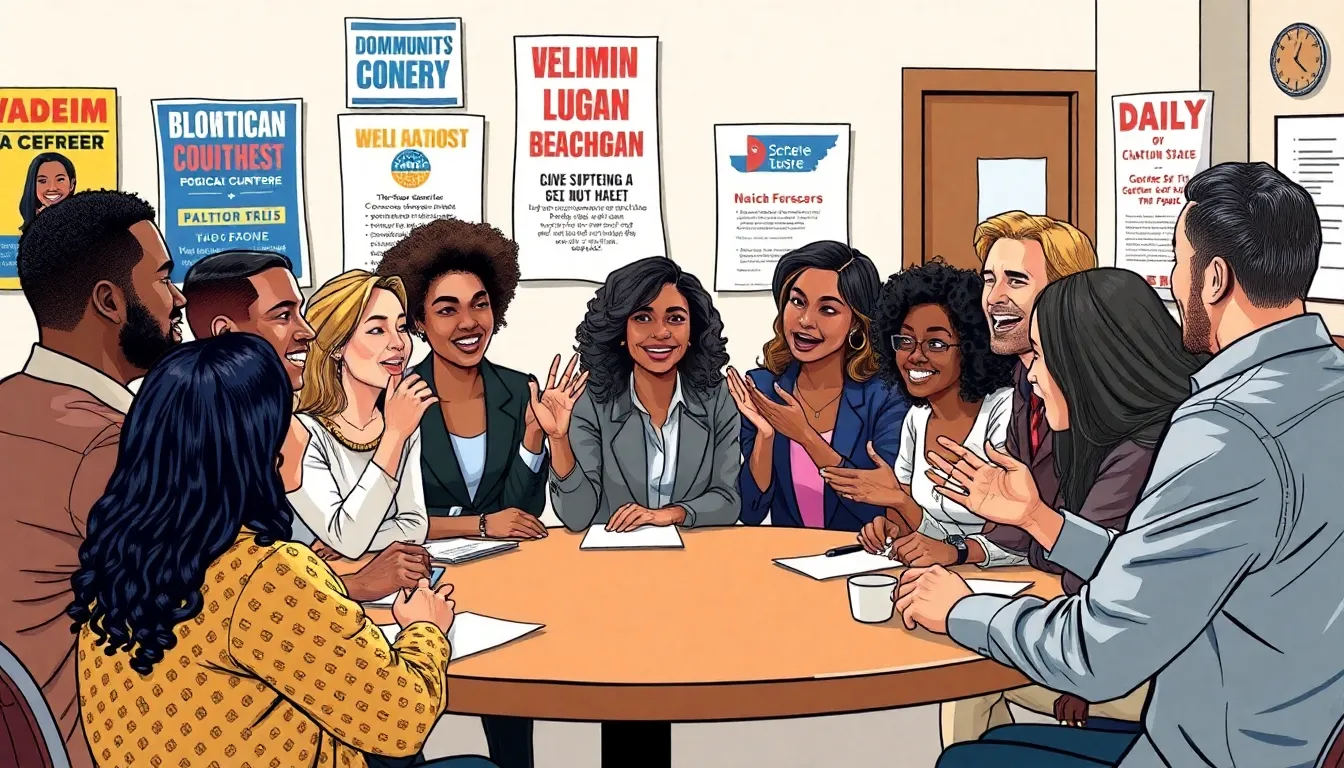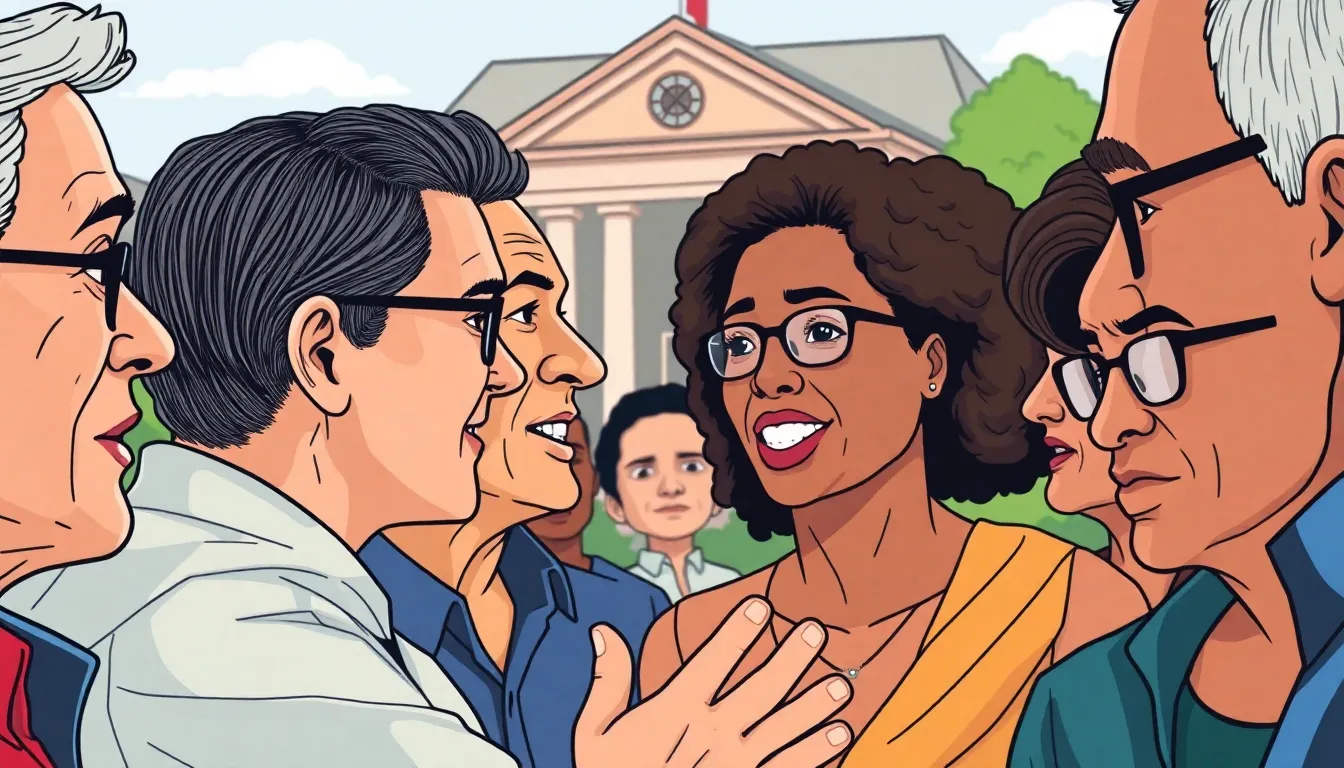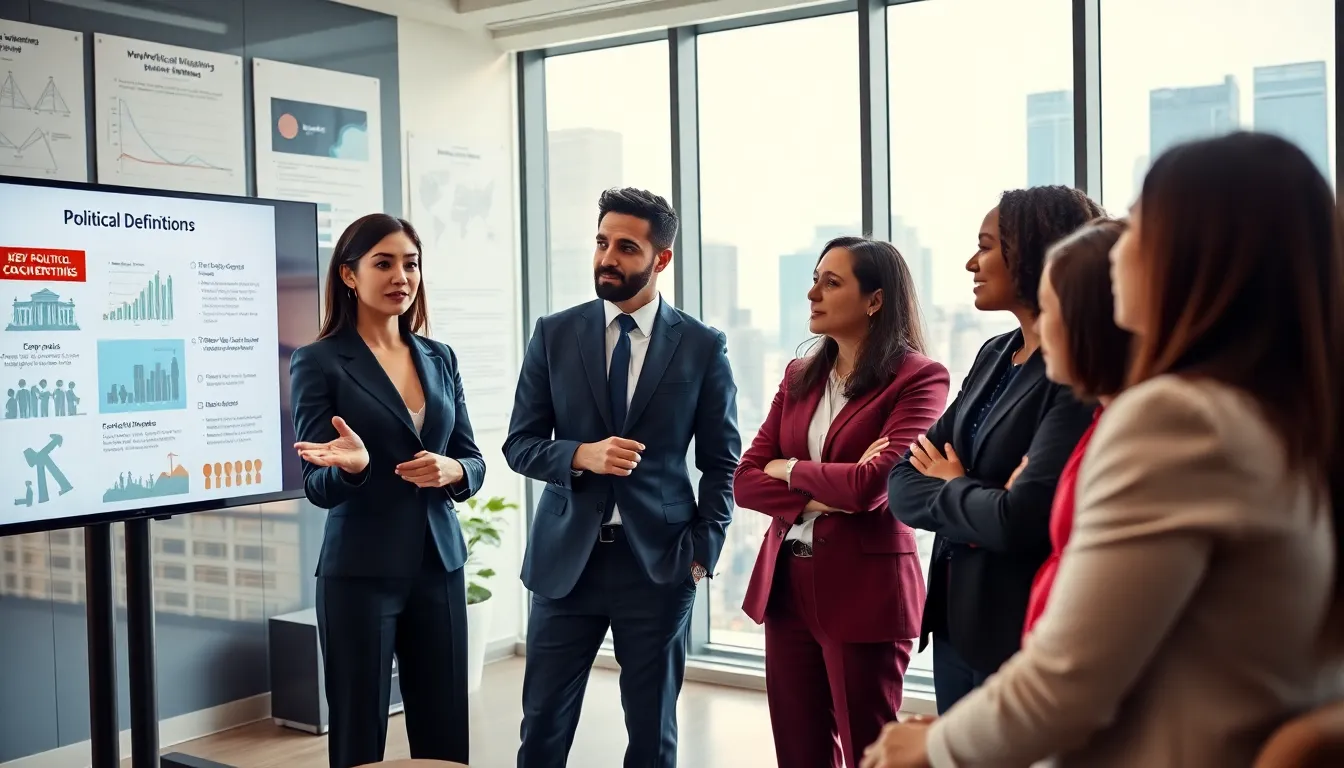Political discourse can feel like a high-stakes game of chess where everyone’s trying to outsmart each other while dodging a few flying tomatoes. It’s that lively arena where ideas clash, alliances form, and the occasional meme goes viral. Understanding this intricate dance of words and arguments isn’t just for the political junkies; it’s crucial for anyone who wants to navigate today’s complex world.
In a time when the airwaves are buzzing with opinions and hashtags, knowing how to engage in political discourse can empower individuals to voice their thoughts effectively. Whether it’s at a dinner table or on social media, mastering this art can lead to enlightening conversations—or at least some entertaining exchanges. Buckle up as we dive into the nuances of political discourse, where wit meets wisdom and every opinion counts.
Table of Contents
ToggleUnderstanding Political Discourse
Political discourse encompasses the conversations surrounding governance, policies, and societal issues, impacting both public opinion and personal beliefs. It serves as a crucial tool for civic engagement, allowing individuals to express views and debate ideas.
Definition and Importance
Political discourse refers to the ways in which political ideas and opinions are communicated. This communication is vital for a functioning democracy, as it fosters informed citizenry and encourages active participation. Understanding political discourse enables individuals to decipher messages from leaders and media, providing the foundation for critical thinking and personal agency. By engaging with diverse perspectives, citizens build a more nuanced understanding of complex issues, influencing public policy and community values.
Characteristics of Political Discourse
Political discourse shows several distinctive characteristics. It often includes persuasive language aimed at influencing public opinion. Emotional appeals regularly surface, invoking feelings to sway listeners. Additionally, the discourse remains context-dependent, with trends and topics shifting based on current events. Specific audiences are targeted through strategic messaging, using platforms like social media to amplify voices. Engaging in political discourse fosters dialogue, enabling exchanges that can lead to collaboration or conflict, both of which are essential to the democratic process.
The Role of Language in Political Discourse

Language plays a critical role in shaping political discourse. It serves as a vehicle for expressing ideas that influence individual beliefs and societal norms.
Rhetoric and Persuasion
Rhetoric forms the backbone of political communication. Politicians and activists utilize persuasive techniques to sway public opinion. Emotional appeals such as fear, hope, or anger amplify messages, making them more impactful. The choice of words can shape perceptions about policies and candidates. Phrasing issues in a relatable manner enhances engagement. When speakers connect with audiences emotionally, they foster deeper consideration of their viewpoints. Effective rhetoric encourages action, prompting individuals to participate in civic initiatives.
Framing and Its Implications
Framing affects how issues are perceived by the public. By presenting information from a particular angle, communicators can shape narratives that resonate with specific audiences. Messages framed around liberty may attract support for certain policies, while those emphasizing security might elicit different responses. The implications of framing are significant, as they dictate which aspects of an issue receive attention. Different frames can lead to varied public reactions and policy outcomes. Understanding framing helps individuals critically evaluate political messages. Engaging with multiple frames promotes comprehensive understanding and informed debate.
Political Discourse in Social Media
Political discourse thrives on social media, shaping conversations rapidly among diverse audiences. This platform revolutionized communication by providing immediate access to information and enabling instant sharing of opinions.
Evolution of Communication Channels
Communication channels have transformed significantly over the past two decades. Traditional media outlets, such as newspapers and television, held a monopoly on political discussions. Now, social media platforms enable users to participate directly in political conversations. Activists and politicians utilize Twitter, Facebook, and Instagram to engage constituents effectively. The rise of live streaming and video content allows for more dynamic presentations of political messages. Engagement metrics reveal the impact of viral content, emphasizing the necessity for real-time responsiveness in political messaging.
Impact on Public Opinion
Public opinion shifts rapidly due to social media’s influence. Citizens encounter political messages through shares, likes, and comments on their feeds. Algorithms prioritize content that generates engagement, amplifying partisan voices and often marginalizing moderate perspectives. Campaigns increasingly leverage social media data to tailor messages to specific demographics. Research indicates that repeated exposure to particular viewpoints shapes beliefs and attitudes. Thus, social media not only provides a platform for discussion but also plays a pivotal role in shaping and reflecting public sentiment.
Challenges in Political Discourse
Political discourse faces several critical challenges that obstruct productive dialogue. Misinformation and disinformation significantly distort public understanding and undermine trust in leaders.
Misinformation and Disinformation
Misinformation includes false or misleading information spread without malicious intent. An example of this could be the inadvertent sharing of incorrect statistics during debates. Disinformation, in contrast, involves deliberate deception aimed at manipulating public perception. Campaigns often deploy disinformation tactics to discredit opponents or sway opinions. The spread of both types often occurs rapidly on social media, where users can easily share unverified content. Research shows that exposed audiences frequently believe what they see and hear, impacting their beliefs. These dynamics lead to confusion among citizens and stifle informed conversations.
Polarization and Its Effects
Polarization divides communities along ideological lines, leading to heightened tensions and decreased willingness to engage in meaningful debate. Political parties become more extreme, causing individuals to identify strictly with one side. As a result, compromise and collaboration diminish significantly. The echo chamber effect exacerbates this situation, where individuals interact primarily with like-minded voices, reinforcing their views. This isolation fosters animosity toward opposing perspectives and creates a hostile environment for dialogue. Studies indicate that polarized societies often experience less civic participation and lowered trust in democratic processes, ultimately hindering effective governance.
Political discourse remains a vital element of democracy that shapes public opinion and community values. By engaging with diverse viewpoints individuals can navigate the complexities of governance and societal issues. The rise of social media has transformed how these conversations unfold allowing for immediate exchanges that can influence perceptions and beliefs.
However the challenges of misinformation and polarization pose significant threats to constructive dialogue. Addressing these issues is essential for fostering a more informed citizenry and encouraging active participation in democratic processes. As political conversations continue to evolve understanding their dynamics will empower individuals to contribute meaningfully to the discourse that shapes their world.





